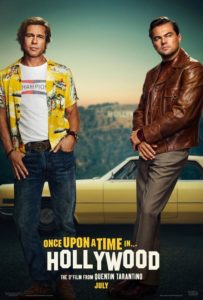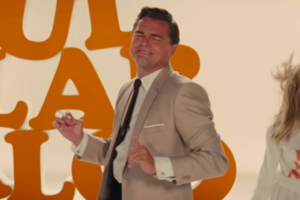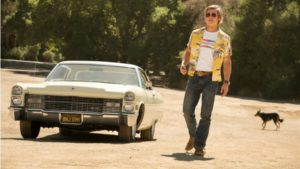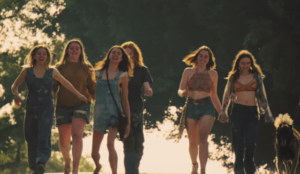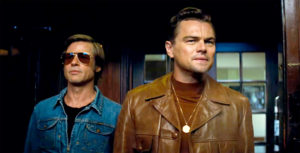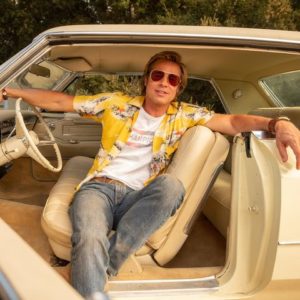I love it when people have a lot of opinions on a movie, especially when that movie is original material that genuinely catches the interest of the moviegoing public. The new Quentin Tarantino picture has topped $100 million domestically with much more coming from the international box office—it’s a solid global hit in a summer of Hollywood franchises and sequels. People like it, but much of the conversation around the picture has been exploring its various controversies.
QT is a provocative filmmaker, someone who likes to tell stories of bloody revenge, with plenty of room for brutal, excessive violence. That’s been one criticism of this film, but far from the only one. His depiction of martial arts icon Bruce Lee is another, and then there’s the question of his vision of the real-life actor who died at the hands of the Manson family, Sharon Tate—Tarantino bristled at the suggestion the comparative lack of dialogue out of the mouth of Margot Robbie, who plays Tate, indicates some kind of sexism. And there’s been more mainstream curiosity with this picture around the filmmaker’s fabled foot fetish.
My thoughts on Quentin Tarantino’s new movie, Once Upon a Time… in Hollywood were mixed. (And, a warning, there’ll be spoilers ahead for the movie, so please go see it, and then come back and read my original review before going further here.)
I thought it was too long, with some scenes and sequences that could’ve easily been cut for a more reasonable running time than 161 minutes.
I was a lot more dubious about the movie than, say, Helen O’Hara, a film journalist from Northern Ireland frequently found in Empire Magazine and on the magazine’s terrific podcast. I always pay attention to what O’Hara says, especially when she digs into feminist issues in film, and she really praised Tarantino’s work here. I was surprised that she didn’t voice any concern with the violence toward women in this picture, a growing trend in Tarantino’s work, and the part of the new movie I had the most trouble with.
In Django Unchained the lead female character is basically a damsel in distress, and in The Hateful Eight, she is lynched with a palpable glee by a couple of the male characters. Now in Once Upon a Time… in Hollywood a couple of female characters are beaten to a pulp in the climactic fight, while the female lead doesn’t have too much to do beside function as an idealized object, a representation of the next generation of Hollywood leaving the male characters in the dust.
But I started to wonder if maybe I’d been oversensitive to this in my first viewing. When my good friend, filmmaker Luckas Cardona-Morisset—now a resident of the City of Angels—on social media called the film “a gift,” that was enough to send me for a second watch.
Yes, film reviewers can present evolving reviews, though few will admit to a change of mind. Having your own blog makes this easy!
In Once Upon A Time… in Hollywood, there’s a character detail for Brad Pitt’s Cliff Booth, the stuntman and buddy to Leonardo DiCaprio’s TV-star, Rick Dalton. Everyone in Hollywood thinks Cliff killed his wife (Rebecca Gayheart) and got away with it. In a flashback scene, Cliff remembers a time when they were together on a boat, where she’s nagging him incessantly, all while Cliff sits with a harpoon gun pointed in her general direction. It’s never revealed whether he actually did kill her, and Pitt isn’t saying.
This note is played for laughs in a way that feels like an ode to a particular brand of old-school patriarchal jocularity. What really bothered me is Cliff is the closest thing this movie has to a hero, someone who is cool under fire—a war veteran who always looks out for his sometimes-undeserving friend, movie star Rick (Leonardo DiCaprio). If Cliff killed his wife, and we’re all supposed to think that’s kind of funny, then that suggests a misogyny baked into the movie even beyond what existed in the era.
Watching the movie again, a few other things came clear that I missed the first time around. It’s not unusual in second viewings for problems with pacing to get ironed out. That was certainly the case here. I didn’t feel it lagged nearly as much.
I appreciated the scene with Julia Butters (who is great here) as the precocious eight-year-old method actor—not actress, as she points out—schooling Rick on how to prepare, and how it paid off later when Rick found his stride in the Lancer pilot scene opposite Luke Perry. I really enjoyed all the typically well-chosen music cues, for example, when Cliff first spots Pussycat (Margaret Qualley) hitching down Sunset Boulevard, Simon and Garfunkel’s “Mrs Robinson” is playing, underlining the kind of age discrepancy discussed in The Graduate.
More so, I took more time to marvel at how Tarantino moves his camera, how everything he does is so deliberate, juxtaposing image with sound. Nothing is accidental, and everything he does has intent and messaging, both text and subtext. I enjoyed the casting, how he chose young actors in support who happen to be the offspring of Hollywood stars, including Qualley (Andie MacDowell), Maya Hawke (Ethan Hawke and Uma Thurman), Harley Quinn Smith (Kevin Smith), and Rumer Willis (Bruce Willis and Demi Moore).
The violence, all of it, is not easy to watch, but then it never is in Tarantino’s films—he prefers to go big with the blood and guts. The line between operatic and cartoonish is thin, but he has no problem jumping back and forth to make his point.
I recognize that even while Rick and Cliff are the ostensible leads in the film, neither is heroic, and we’re not necessarily supposed to consider their actions as such. Cliff lives in a grim trailer behind a Drive-in in Van Nuys. His bad attitude got him in a pointless fight with Bruce Lee, which has soured his career as a stunt performer. He’s fucked up his own life, and to his credit, he’s old enough to recognize his mistakes. If Cliff killed his wife and managed to stay out of prison, he sure isn’t admirable for it, and neither is Rick, and maybe the movie doesn’t want us to admire much about them, aside from maybe their loyalty to each other. If any of this is funny, its a very dark, unpleasant, and mordant humour.
These guys are piteous, and just a small part of this expansive scene in late-’60s Hollywood. You can wonder whether they’re worthy of the centre of this story, but then you can wonder about any of Tarantino’s idealized-yet-retrograde perspective, given all that was bad about Los Angeles in the late 1960s. It doubt very much it was nearly as glorious as Tarantino imagines, even if you were a white, male TV star.
Having seen it a second time, I’m more interested in what a film opening in 2019 but set in 1969 has to say about today. The schism between generations and cultures sure feels familiar, as well as a sense of secret rot, a cultural cancer, and resentment between those who feel disenfranchised and those clinging to power.
Once Upon A Time… in Hollywood is far from a perfect film, but maybe it’s more complex, and not as simply problematic, as I first made it out to be.
There are plenty of other elements of my original review I still stand by: I still think the movie is unjustifiably long. I still have trouble with the scene at the Spahn ranch where Cliff goes to visit his former colleague, George (Bruce Dern). Yes, the suspense is palpable, but it doesn’t add up to much, aside from bringing a general sense of creep.






